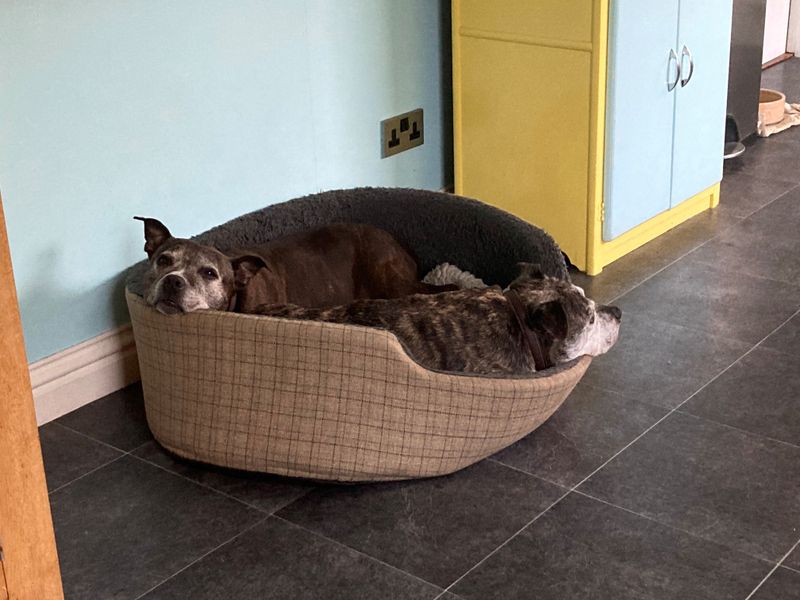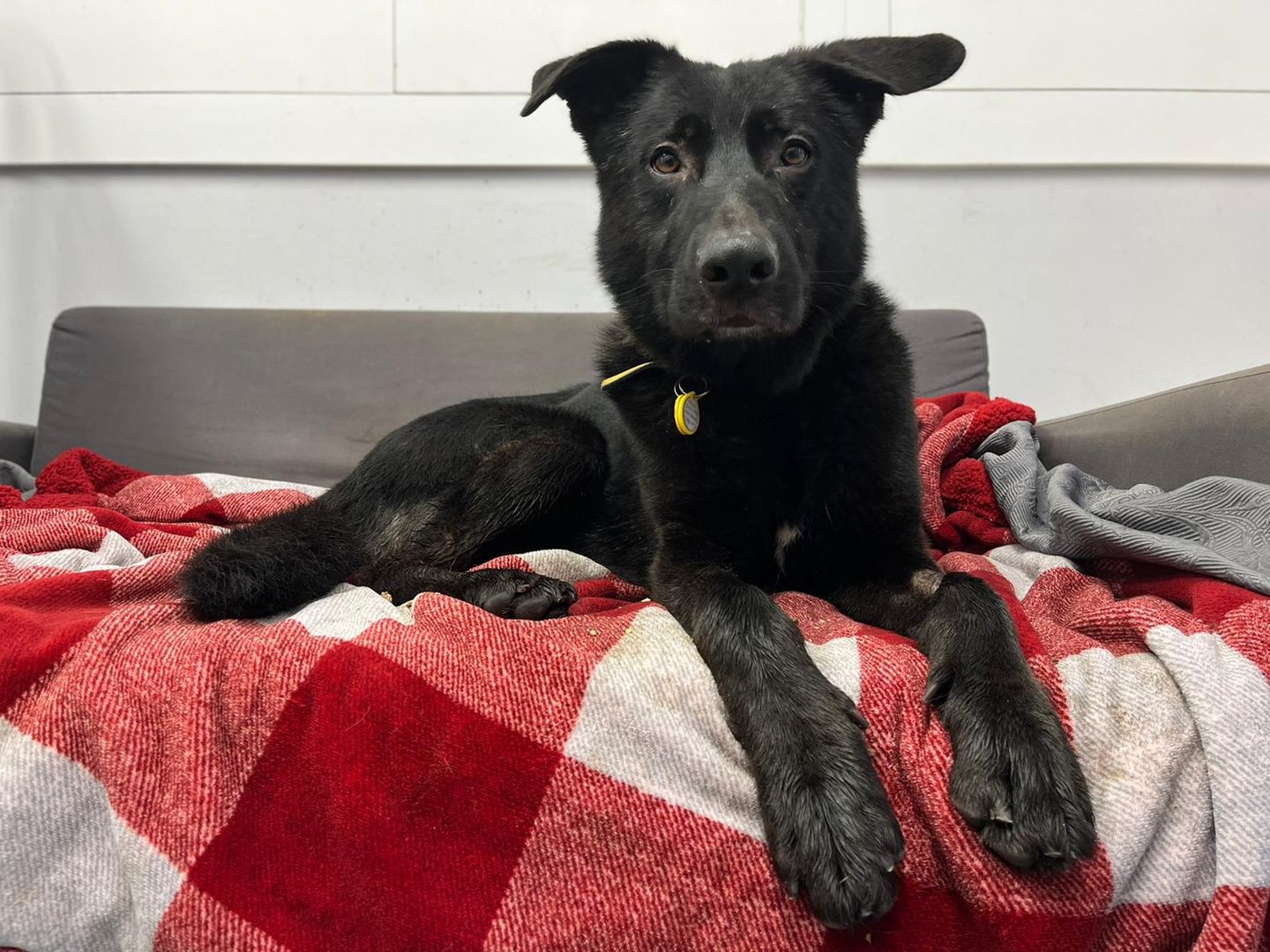How to help a rescue dog get settled into your home
If you've rescued an adult dog then you'll want to ensure they settle into your home. Here's how to do that.

Rescuing an adult dog is one of the most rewarding things you can do. But it’s important to remember that your new best friend has their own story.
Your pup may have experience in a previous home or have spent quite a while in a rehoming or rescue centre. This means it could take them a while to adapt to the change, and they might need a little extra support to get settled in.
You may well have experience of settling a puppy into your home. But, if this is your first adult rescue dog it’s important to know, and keep in mind, that it will be different for them.
It’ll take a little time and patience, but they will feel comfortable and relaxed in their new home before you know it.
Here’s how to help a rescue dog settle in.
How to prepare your home for an adult dog
Your rescue dog may feel anxious when they first arrive. You want to ensure you have created a space that offers them choices while making them feel as safe and comfortable as possible.
Buy the essentials:
- bed
- blanket
- selection of toys and feeding enrichment
- food bowl and food
- water bowl
- collar, lead and tag
- appropriate cleaning products.
Prepare your house for their arrival:
- Dog-proof your house, moving anything you don’t want them to get hold of and setting up a baby gate, if required.
- Check for hazards around the home such as chemicals, wires, medicines and toxic plants. When you first pick up your pooch make sure you supervise them in each room in case of any unexpected hazards.
- Plan out the space – working out where your dog will rest, sleep, eat etc.
- Set up a den area in a quiet space away from the main, busy thoroughfares.
Top tip: Unlike puppies, adult dogs are likely to have an established routine and preferences. Make sure you know what this is and ensure it matches your own lifestyle and routine. If not, see if there are reasonable changes you are happy to make to ensure it does.
As well as their likes and dislikes, it’s important to find out if they require any ongoing veterinary care. Likewise, do they have any specific training or behaviour needs? You should also ask what they eat and if they have any special dietary requirements.
The first few days with your adult rescue dog
The first few days after you bring your rescue dog home can be the hardest. It may well have been quite some time since they have lived in a home. So, here are some tips to help them settle in and make it as stress-free as possible.
Tip one: Let them settle in at their own pace
While most puppies are relaxed and inquisitive, adult dogs may be worried when they arrive at your home. You may find they hide at first and don’t seem to want to interact with you. Don’t worry – this is perfectly normal. To help them relax you should let them go at their own pace.
Allow them to spend time on their own without disruptions and come to you when they are ready. They may come over and look at you, sit nearby or drop a toy at your feet.
Avoid any visitors to the home during this time and make sure it is calm and quiet, so they get familiar with their new surroundings in peace.
Tip two: Avoid fussing them and don’t force interaction
You don’t want to fuss your dog too much, especially when they first arrive and particularly if they appear uncomfortable. Wait for them to approach you and keep your hands at your side.
If they lean in, stroke them on their chest or shoulders for three to four seconds. Then wait to see if they initiate further interactions. This is to make sure they are enjoying it and feeling relaxed.
If they don’t seem interested and haven’t approached you for fuss, then don’t force it. Give them some space and allow them time to relax and feel more confident around you.
Tip three: Allow them to spend time in their den area undisturbed
That den you created before pup arrived will be particularly important during these first few days. They will learn that it is a quiet, safe space where they can go to spend time on their own. They can relax here and simply observe while they get used to the new household. They won’t feel exposed, and this will help to build their confidence.
You could add enrichment, treats and toys to this area to encourage them to use it and help them to learn that it’s a positive place. But, they should never be disturbed when they are here.
Tip four: Start using food enrichment
Food enrichment can be a positive way to encourage your pooch to explore their new environment. Your dog may be unsure around you at first. This is something you can do without constant interaction which will feel less intense and help to build their confidence.
Tip five: Keep walks short
You’ll no doubt be keen to start giving your rescue dog lots of new and exciting walks. However, over the first few days you want to keep walks short and in the same location. This will give pup time to get used to their new area and get their bearings.
Tip six: Carefully introduce them to other pets
It’s important to ensure that your pooch is introduced slowly and carefully to any other dogs or cats that live in your home.
Tip seven: Create a routine and stick to it
Start to create a routine and stick as closely to it as possible. This will help your dog get used to their new home and start to know what to expect and when. Remember, this may, at least in part, be based around what they are already used to which will help them to settle.
Tip eight: Be understanding and patient
You are unlikely to know what the dog is used to from previous homes. They may, for example, have been allowed to sleep on their owner’s bed or on the sofa. If this isn’t something you want, then use treats and toys to make the den area much more appealing to them. Despite being an adult, they may never have been house trained and so could need help with this.
Being patient and understanding is so important to help them settle in. This also means looking out for signs that they are feeling anxious or frightened, so you can respond appropriately.
Tip nine: Keep a diary
You could keep a settling-in diary for the first three months. This is a place where you can note down everything from your pup’s likes and dislikes to behaviours and eating habits.
This will help you get to know your dog and what is normal for them. You may notice changes over the first few days, weeks and months and this will help you to keep a track of them.
Tip ten: Prepare for unexpected behaviour
You can’t always know exactly what an adult dog will be like in your home when you see them in kennels. This means they may display some unexpected behaviours when you arrive home.
Need to know: Don’t forget, in those first few days while you are helping them to settle into their new home you also need to update their microchip details, organise pet insurance and register with your local vet.

Settling a rescue dog at night
A dog’s first night in a new home can be very daunting. Here’s how you can help ensure it is calm and peaceful for your pooch.
- If your dog has separation anxiety, then you may want to sleep nearby (perhaps downstairs with them or have them in your room.) Then slowly move yourself (or their bed) further away. However, it’s best to speak to the rehoming centre for specific advice on this.
- Make sure they have a warm and comfortable bed so it’s an attractive space to them. It should be large enough for your dog to stretch out with their water and toys nearby.
- Consider which room to place their bed in. It’s up to you if you want it in your room or not. But it must be somewhere the dog can relax. So not, for example, near a ground floor window where cars or people may be heard going past at night.
- It should be in a place that’s easy for them to get to it and away from any hazards such as wires and electric sockets.
- Ensure you introduce them to their bed during the day, so they know where it is. Then you can settle them in it before going to bed yourself. If it’s right for the dog, you may want to give them an appropriate chew to help with this.
- You can confine them to one area (or room) of the house. However, if they cry then they may be worried. If so, you want to avoid this by giving them the opportunity to explore once you have gone to bed. Even if they don’t choose to, being given the choice will help them to feel more comfortable.
You know the saying ‘You can’t teach an old dog new tricks’? Well, you certainly can! Use reward-based training and as well as them learning new skills, you’ll also help strengthen the bond and trust between the two of you.



